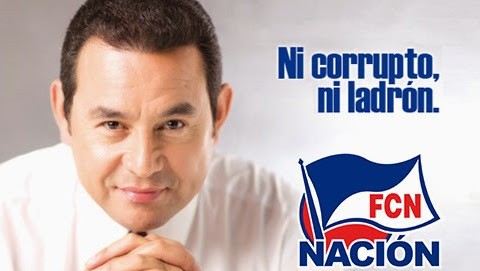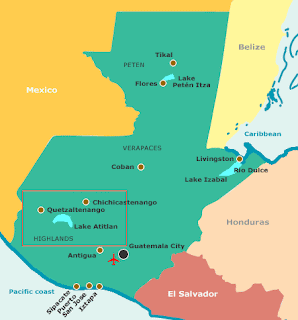Sometimes
it’s hard to believe that it’s actually 2015. Usually I have that feeling when
I travel to developing countries and take in the standard vistas of poverty:
terrible roads, daily power cuts, throwing your TP in the trash, etc. And
Guatemala is generally no exception, though our experience of it thus far has largely
been one of sheltered ex-pat comfort. But lately, I’m also getting that “is this
really 2015” feeling when I turn to the NY Times and read yet another
incredulous account of bigotry and voodoo policy, courtesy of Los Republicans.
Trump and
Friends exude a certain 1914 vibe: the world on the brink of war, entire continents
full of dark-skinned, bloodthirsty haters of freedom, with carpet bombing and
personal armaments being the only sensible way out. It’s the kind of rhetoric
that usually passes for policy in the Banana Republics – rile up enough fear
about some evil-doers (invoking the U.S. has worked pretty well) and you don’t
actually have to say anything else of substance. And it turns out the
Know-Nothing base is alive and well in the First World, too.
| New markets for Trump piñatas in LatAm |
Jimmy
Morales, the president-elect of Guatemala, has elicited many fair comparisons
with The Donald: both political outsiders, both with zero experience in elected
office, and neither with any particular compulsion to articulate specific
policy positions on issues. The difference is that Trump’s wolf cry is
bigot-catering Islamophobia, phobia of refugees and immigrants, and generalized
phobia of anything phobi-able. Morales, by contrast, built his campaign on a
maddeningly simple but simultaneously semi-righteous slogan: “Neither corrupt,
nor a thief.” What leadership credentials of statecraft! But it’s not really a
phobia at all, rather a rejection of the kleptocratic state Guatemala has
become, a country where the 250 richest residents have the same amount of
wealth as the poorest 8 million (that’s equivalent to to the top 0.001% having
the same as the bottom 50%, whereas in the U.S. the 1% have about the same as
the bottom 20%).
 |
| Neither corrupt, nor a thief.. |
And here we
are: a comedian who defends his blackface routine can be the president of a developing
country, today, in soon-to-be 2016. Amazing, but at the same time perhaps not
shocking, especially in a country where a majority of rural inhabitants cook on
open fires inside their homes and literacy is a privilege. More surprising by
far is the 21st century reality up North, where a Trump or a Cruz
can be at least the second-best leadership proposition that the US has to
offer, especially on the tail of the Obama Hope-Change Enlightenment.
| ...just a racist! |
--
Kat and I
have actually met an amazing number of new people in Guate thanks to Pepe, our
dog. This is probably an obvious feature of pet ownership, but it turns out it’s
pretty easy to talk to strangers about dog food. The cool thing is that a lot
of these strangers have amazing stories to tell. A few weeks ago we met Luis
Argueta in the dog park a few blocks from our building. Luis is an accomplished
documentarian, whose films focus on the experiences of Guatemalan immigrants in
the US. One of his films, abUSed, tells the story of the 2008 Postville Raid, in which
the U.S. Immigration and Customs Enforcement (the serendipitously acronym-ed ICE)
proudly showcases their skills in handcuffing factory workers and separating
families. In the case of the Postville, the factory was a Kosher slaughterhouse
managed by the orthodox Jewish Rabushkin family, and a majority of the 400 people
arrested and subsequently deported were Guatemalan immigrants. Argueta
interviews many of their families, and depicts lives of struggle and hope. The trailer is definitely worth a watch. Also, here’s an excellent piece on the recent history of Postville and its unlikely transformation into a Midwestern hub of
diversity.
 |
| Easy pathway to citizenship for this future migrant/ wild bandito! Also he will take your jobs. |
In this,
the Year of the Fear of the Refugee, the Bigots of the Americas are crossing
paths, in a way. Morales is a comedian who also happens to be a racist. But it
was his idea of a State that serves, instead of State that steals, that
catapulted him to victory. By contrast, Trump et al are people who have found
that, in 2015, bigotry can be winning idea. As the Republican crazy train
careens toward Iowa, let’s consider Postville and all the other villes like it.
And by that I guess I mean making your conservative family members watch that
trailer. Good luck and Feliz Navidad!
--
In other (sunnier) news, Guate is treating us supremely well. My work continues to be stimulating
(more soon on that, for real) and Kat just accepted a job at Semilla Nueva,
where she’ll be advocating for the scale-up of bio-fortified agriculture, both
to increase yields of small-holder farmers and decrease rates of malnutrition
among Guatemalan youngins. In the fun department, we’re about to head off on a
week-long road trip with Ben and Germaine to the Oriente: Semuc Champey, Rio
Dulce and Caribbean Coast. Hasta 2016!






















